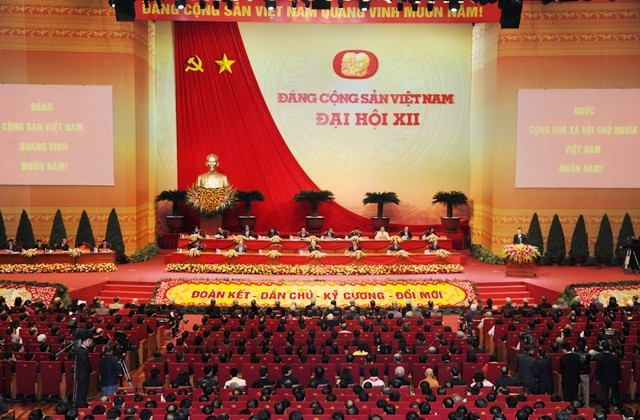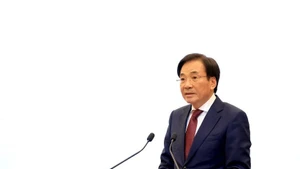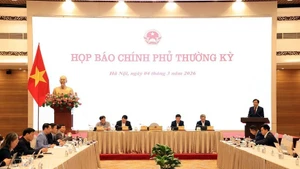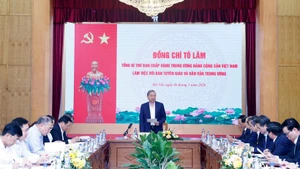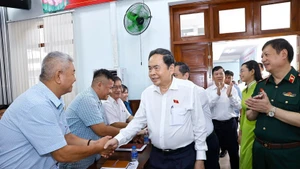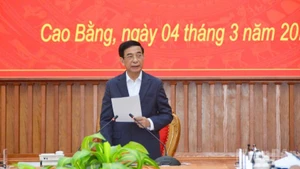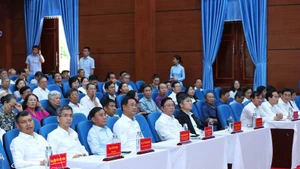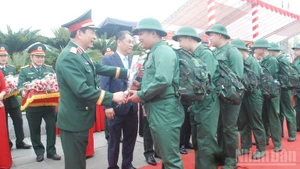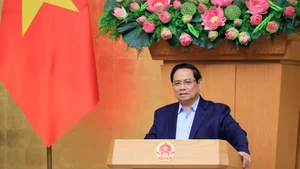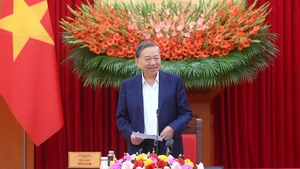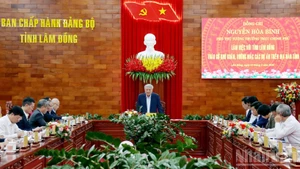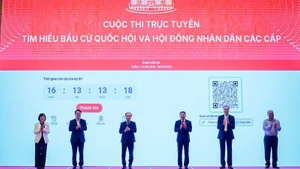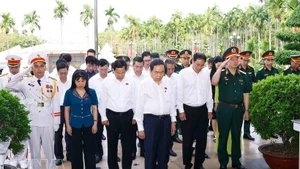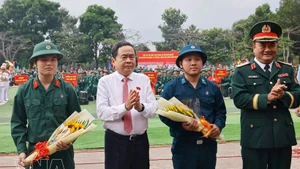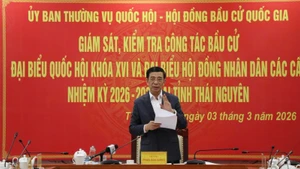The Congress received 248 messages and letters of congratulations from political parties, organisations, and international friends worldwide, including from diplomatic missions in Ha Noi.
Reviewing the implementation of the Resolution of the 11th National Congress, the Congress assessed that: The entire Party, people, and armed forces made great efforts and attained significant results. The country’s ec onomy overcame numerous difficulties and challenges, with enhanced scale and potential, fundamental macroeconomic stability, and sustained economic growth at a reasonable level. Efforts to reform the growth model, restructure the economy, and implement the three strategic breakthroughs were actively pursued and initially yielded positive results. The fields of culture and society also witnessed encouraging progress.
However, the reform was neither comprehensive nor synchronous. Several socio-economic targets were unmet, and numerous indicators and criteria for the goal of transforming Viet Nam into a fundamentally modern-oriented industrialised country by 2020 remained unfulfilled. The degradation in political ideology, ethics, and lifestyle among a considerable number of cadres and Party members, along with bureaucracy, corruption, and wastefulness, had yet to be effectively curbed. Certain aspects of Party building and political system consolidation showed slow progress.
Reflecting on 30 years of Doi Moi (Renewal) from 1986 to 2016, the Congress affirmed: Thirty years of renewal represent an important historical period in the cause of national construction and defence, marking the comprehensive maturity of the Party, State, and people. The Doi Moi process was revolutionary in scale and significance — a profound, comprehensive, and thorough transformation, and a great revolutionary cause of the entire Party, people, and armed forces — aimed at the goal of “prosperous people, a strong country, democracy, justice, and civilisation.”
The Congress outlined six key tasks, including: strengthening the Party building and rectification; developing a streamlined and efficient political system; focusing on measures to enhance growth quality, labour productivity, and the competitiveness of the economy; resolutely and persistently safeguarding the independence, sovereignty, unity, and territorial integrity of the homeland; effectively mobilising and promoting all resources and the creativity of the people; and fostering the human factor across all aspects of social life.
The Congress elected the Party Central Committee (PCC), consisting of 180 official members and 20 alternate members. The PCC then elected the Politburo, comprising 19 members. The Secretariat included several Politburo members assigned by the Politburo and three members elected by the PCC.
Comrade Nguyen Phu Trong was re-elected as General Secretary.
At its sixth and seventh plenary sessions, the PCC additionally elected four members to the Secretariat.
At its 4th Plenum, the 12th Party Central Committee issued Resolution No. 04-NQ/TW on “Strengthening Party building and rectification; preventing and repelling the degradation of political ideology, morality, and lifestyle, as well as the manifestations of ‘self-evolution’ and ‘self-transformation’ within the Party.”
The Resolution of the 4th Plenum of the 12th Party Central Committee broadened the scope and level of identification of signs of degradation. It clearly defined 27 specific manifestations of ideological, moral, and lifestyle degradation, as well as “self-evolution” and “self-transformation.”
The Resolution set out four groups of solutions to prevent and repel the degradation of political ideology, morality, and lifestyle, as well as the manifestations of ‘self-evolution’ and ‘self-transformation’ within the Party: political and ideological measures, including self-criticism and criticism; mechanisms and policies; Party inspection, supervision, and discipline; and promotion of the role of the people, the Viet Nam Fatherland Front, and socio-political organisations.
(Compiled from the Documents of the 12th National Party Congress; Nhan Dan Newspaper)
GENERAL CONTEXT
January 20–28, 2016: The 12th National Party Congress convened with 1,510 delegates, reviewing 30 years of the Doi Moi (Renewal) process (1986–2016).
October 6–14, 2016: The 4th Plenum of the 12th Central Committee discussed measures to prevent and repel degradation, "self-evolution", and "self-transformation".
2016–2020: Average GDP growth reached 5.9% per year, macroeconomic stability was maintained, and total GDP reached 343 billion USD.
2020: GDP per capita stood at 3,521 USD, surpassing the target set.
DOMESTIC SITUATION
After 30 years of implementing Doi Moi process, and five years of carrying out the Platform for National Construction in the transitional period towards socialism (which was supplemented and developed in 2011) and the Socio-economic Development Strategy for the 2011–2020 period, Viet Nam achieved numerous significant and historic accomplishments. These affirmed that the Party’s reform policy was sound and creative, and that the socialist-oriented path chosen by Viet Nam was consistent with national realities and global development trends.
However, the renewal process was neither comprehensive nor synchronous. Several socio-economic targets were unmet, and numerous indicators related to the goal of transforming Viet Nam into a fundamentally modern-oriented industrialised nation by 2020 remained unfulfilled.
The degradation of political ideology, morality, and lifestyle among a considerable portion of cadres and Party members, along with bureaucracy, corruption, and wastefulness, had yet to be effectively addressed.
Targets for the 2016–2020 period: GDP growth of 6.5–7% per year; GDP per capita at 3,200–3,500 USD; labour productivity growth of 5% per year; and agricultural labour share at 40%.
INTERNATIONAL SITUATION
Globally, peace and cooperation for development remained the dominant trend. However, the world and regional situations became increasingly complex, with a slow and uneven global economic recovery, political crises across several regions, and intensified competition among major powers in the Asia-Pacific. The East Sea/South China Sea situation became increasingly complicated.
The world economy recovered slowly and unevenly, facing numerous challenges.
Meanwhile, the Fourth Industrial Revolution surged forward, with rapid advances in digital technology, artificial intelligence (AI), the Internet of Things (IoT), and blockchain. These developments created new opportunities but also posed challenges related to employment and cybersecurity.
